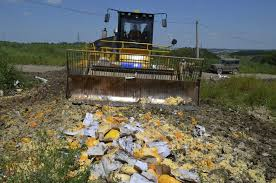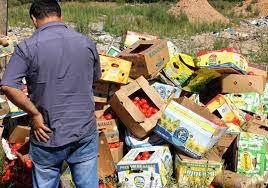 Tons of smuggled cheese pushed into landfill Tons of smuggled cheese pushed into landfill The nation’s minimum monthly income is insufficient. The monthly average cost to live in Russia averages $210, but the minimum monthly income is $155, reported by the American Borgen Project a non-profit organization addressing global poverty and hunger. The project reported before the 2014 Winter Olympic Games in Sochi that despite the harrowing poverty, “it appears that the 2014 Winter Olympic Games, set to be hosted in Sochi, has taken prominence over the rampant poverty in Russia. In 5a Akatsy Street, located in a neighborhood with deteriorating infrastructure, a brand-new multi-million dollar highway brazenly cuts through the surrounding poverty,” they said. “The glossy highway stands in salient contrast to the squalor of 5a Akatsy Street, locales in which residents have barely sustained themselves without running water or a sewage system. While the Russian government sanctions the construction of stadiums and highways, the majority of Sochi residents live in dwindling, contaminated and neglected villages.” Similar to the public show of wealth and glossed over realities of the average Russian citizen at the 2014 Winter Winter Olympics, the Putin government claims the food sanctions are good for local agriculture producers. But the availability of high-priced produce blocks economic access by those living at and below the poverty line. The economics are basic: In scarcity the prices increase and in abundance the prices are reduced. With the sanctions against food imports, Russians living below the poverty line are inordinately affected forcing them not buy high-priced cheese, fruits and vegetables. While Putin has no qualms about sanctioning imports of food, the flow of tobacco leaf to Russian cigarette companies remains high. As far back as 2009, 99 percent of leaf tobacco was imported to the country’s factories with a value of $1 billion. The Russian Federation has one of the highest smoking rates in the world, according the US National Institute of Heath. The World Health Organization has identified "The biggest health problem facing Russia is the very high level of mortality among working aged men," says Martin McKee, an expert in Russian public health at the London School of Hygiene and Tropical Medicine. Life expectancy for Russian men is 60 years of age which is well below the average life span of 77 years for other western European countries. Longevity of men has stagnated, and a major culprit has been high levels of alcohol consumption. Since the breakup of the Soviet Union, alcohol and tobacco use have risen, as Russians have struggled to adapt to economic change, health experts say. If the health and well being of Russian citizens had been considered in administering sanctions against the West, perhaps Putin should have put sanctions on importation of tobacco leaf and alcohol instead of the food that families rely on to feed their children. Resources https://news.vice.com/article/russia-is-destroying-tons-of-western-food-to-mark-a-year-of-retaliatory-sanctions http://www.cnn.com/shows/fareed-zakaria-gps http://www.ncbi.nlm.nih.gov/pmc/articles/PMC3732080/ http://www.tobaccointernational.com/0408/feature2.htm
3 Comments
eileen
18/8/2015 05:30:14 am
Always sad to see food wasted when people are starving.
Reply
Dava Castillo
18/8/2015 09:44:55 am
Thank you for reading and commenting Eileen.
Reply
Eileen
18/8/2015 11:46:47 am
They do Dava and unless you have leaders that care about the ordinary people were all sunk.
Reply
Leave a Reply. |
Dava Castillo
is retired and lives in Clearlake, California. She has three grown
children and one grandson and a Bachelor’s degree in Health Services
Administration from St. Mary’s College in Moraga California. On the
home front Dava enjoys time with her family, reading, gardening, cooking
and sewing. Archives
November 2015
|


